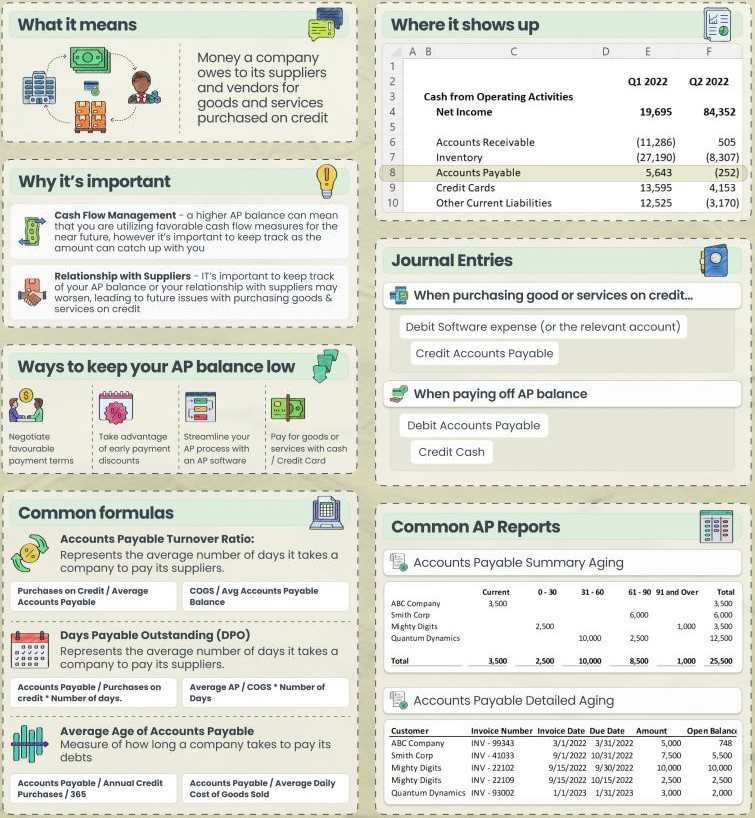Accounts Payable (AP)
Accounts Payable (AP) is a vital component of any company’s financial operations. It represents the money a company owes to its suppliers for products or services it has received but not yet paid for. Efficient management of Accounts Payable can significantly impact a company's cash flow, vendor relationships, and financial health.


What is Accounts Payable (AP)?
Accounts Payable, or AP, refers to the amounts a company owes to vendors for goods and services. This liability appears on a company’s balance sheet and is crucial to managing cash flow, which can directly affect profitability. Managing AP efficiently can prevent late fees, take advantage of early payment discounts, and enhance supplier relationships.
Strategies to Improve Your Accounts Payable Processes
Automate Invoice Processing
Automation can save time and reduce errors in Accounts Payable. AP automation software can process invoices, automatically matching purchase orders, and approvals, and then initiate payments. By reducing the manual entry of data, businesses can achieve faster invoice processing and minimize mistakes. For instance, automation can reduce AP processing time by up to 80%, making it a crucial step for any business looking to improve efficiency.
Implement a Three-Way Matching System
A three-way matching process verifies that information on the invoice, purchase order, and receiving report match before payment is approved. This helps prevent overpayments, duplicate payments, and fraud. Using automated matching systems can streamline this process, minimizing time spent on verification and ensuring accuracy in your AP records.
Centralize Your Accounts Payable Operations
Centralizing AP operations enables companies to standardize processes across departments, making it easier to monitor spending, process invoices consistently, and streamline approvals. A centralized AP system also aids in reducing errors and controlling costs.
Build Strong Relationships with Vendors
Building strong vendor relationships can help you negotiate better payment terms and discounts. Some vendors offer early payment discounts that can improve cash flow. Clear, consistent communication with suppliers can also help resolve disputes faster and make future negotiations more favorable.
Set Clear Payment Policies
Clear payment policies for your Accounts Payable department can improve consistency, ensure timely payments, and support cash flow management. These policies may include due dates, payment methods, and the approval process. By establishing clear guidelines, companies can reduce errors and delays in their AP processes.
Review AP Aging Reports Regularly
An AP aging report categorizes outstanding invoices by how long they have been overdue. Regularly reviewing this report allows companies to prioritize payments, manage cash flow, and minimize the risk of late fees. An effective AP aging report will display all unpaid invoices and highlight those requiring immediate action.
Optimize Your AP Workflow
A structured AP workflow improves approval processes, minimizes bottlenecks, and reduces delays. Consider mapping out your existing process and identifying pain points. For instance, digital workflows reduce paperwork and manual tracking, allowing invoices to be reviewed and approved faster.
Maintain Accurate Records
Keeping accurate records is essential in AP to avoid errors and ensure efficient audits. Ensure all invoices, receipts, and purchase orders are accurately entered into your AP system. By keeping thorough records, companies can quickly resolve discrepancies and ensure all financial statements accurately reflect the business’s standing.
Establish Clear Approval Hierarchies
Set up clear approval hierarchies to ensure invoices are reviewed and approved efficiently. This reduces delays and prevents unauthorized payments, ensuring that AP personnel process invoices correctly and prevent unnecessary expenses.
Regularly Audit Your Accounts Payable
Regular AP audits help companies identify errors, discrepancies, and inefficiencies. By conducting quarterly or annual audits, businesses can improve accuracy, detect fraud, and maintain compliance. An AP audit typically reviews documents, approval trails, and payment procedures, providing valuable insights for optimizing workflows.
Why Efficient Accounts Payable is Crucial for Financial Health
Efficient AP management helps improve cash flow, prevents penalties, and can even enhance the company’s credit rating. By implementing these strategies, businesses can streamline their AP processes, reduce costs, and ultimately contribute to the company’s profitability.
Key Takeaways
- Automate invoice processing to save time and reduce errors.
- Implement three-way matching to prevent fraud and overpayments.
- Centralize AP operations to standardize processes.
- Foster strong vendor relationships for better terms.
- Establish clear payment policies for consistent and timely payments.
- Regularly review AP aging reports to manage overdue invoices.
- Optimize AP workflow to eliminate bottlenecks.
- Maintain accurate records to avoid errors.
- Define approval hierarchies to streamline processing.
- Audit AP processes periodically to detect and address inefficiencies.
Optimizing your Accounts Payable process doesn’t just improve efficiency; it plays a critical role in maintaining a positive cash flow, strengthening vendor relationships, and positioning your company for long-term success. By following these strategies, companies can make the AP process smoother and more effective.








